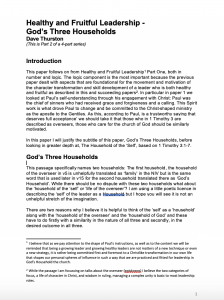Healthy and Fruitful Leadership – God’s Three Households
Dave Thurston
PDF Download
IntroductionThis paper follows on from Healthy and Fruitful Leadership Part One, both in number and logic. The logic component is the most important because the previous paper dealt with aspects that are foundational for the movement and motivation of the character transformation and skill development of a leader who is both healthy and fruitful as described in this and succeeding papers . In particular in paper 1 we looked at Paul’s self-understanding through his engagement with Christ: Paul was the chief of sinners who had received grace and forgiveness and a calling. This Spirit work is what drove Paul to change and be committed to the Christ-shaped ministry as the apostle to the Gentiles. As this, according to Paul, is a trustworthy saying that deserves full acceptance’ we should take it that those who in 1 Timothy 3 are described as overseers, those who care for the church of God should be similarly motivated.
In this paper I will justify the subtitle of this paper, God’s Three Households, before looking in greater depth at, The Household of the ‘Self’, based on 1 Timothy 3:1-7.
God’s Three Households
This passage specifically names two households: The first household, the household of the overseer in v5 is unhelpfully translated as ‘family’ in the NIV but is the same word that is used later in v15 for the second household translated there as ‘God’s Household’. While there should be no dispute with these two households what about the ‘household of the ‘self’ or ‘life of the overseer’? I am using a little poetic licence in describing the ‘self’ of the leader as a Household but I hope you will see it is not an unhelpful stretch of the imagination.
There are two reasons why I believe it is helpful to think of the ‘self’ as a ‘household’ along with the ‘household of the overseer’ and the ‘household of God’ and these have to do firstly with a similarity in the nature of all three and secondly, in the desired outcome in all three.
1. A Complex Unity
The self of the overseer, the overseer’s household and the household of God are each a complex unity. This is most easily understood with regards to the overseer’s household: made up of many parts with different functions and roles. The same is the case with the household of God, that variety of parts and functions can also at times be translated into the body of Christ for a different rhetorical effect. But what about the self? My argument will be that it is only when we see the ‘self’ or ‘soul’ as a complex unity with many parts and function that needs to be rightly ordered do we begin to understand what Paul is describing.
2. The Right Ordering of a Complex Unity
Each of the entities; the household of the overseer’s self, the overseer’s household, and the household of God, all need to be rightly ordered, ruled, managed and cared for. It is in understanding this that we have an insight into why the rightly ordered ‘self’ under Christ, can lead to a rightly ruled household and that these are prerequisites in someone who is able to care for God’s household.
The Household of the ‘Self’ v1-7
In verses 1-7 the necessary characteristics of an appropriate life of a leader is described in very specific detail. The nature and quality of a variety of relationships; their self-control with regard to emotions, passions and substances as well as the corresponding virtues. Almost as an aside it includes in the list the ability to teach.
This all needs to be expressive of a life that has experienced testing– not a recent convert, but a life that is integrated and consistent.
I want to develop this a little more later on in the paper. Let’s move to the Leader’s Household.
The Leader’s Household v5
As I’ve already mention ‘family’ in v5 should be translated ‘household’. There is a good reason for doing this, ‘family’ for us conjures up the idea of the nuclear family whereas Household in the first century was a very different beast. We only have to remind ourselves of the Household codes of Ephesians 5:21-6:9 as well as Colossians 3:18-25; husbands, wives; fathers, children; masters, slaves. A Household in the first century could be a complex unity that could have a business attached i.e. a tent-making business such as the Household of Pricilla and Aquila. Ruling/managing a household required delegation, planning, coordination so that the whole was healthy and flourishing.
The Church – God’s Household v14-15
The Household of God is referred to in v15 as the pillar and foundation of truth. Given that, it is no wonder that Paul is concerned to instruct Timothy so people will know how to conduct themselves in relation to this glorious reality.
Do we even believe the church could be the pillar and foundation of truth? We are more used to talking about the Bible or Christ in such exalted terms.
We need to see gospel and church as interconnected; when the church lives as it should, it demonstrates the living embodiment of the gospel.
We will dig more deeply into the Leader’s Household and the Household of God in the next two papers. But let us notice right from the beginning that growing leadership is a chain of three links that begins with the household of the self.
The Household of the ‘Self’
The diagrams below are taken from Dallas Willard’s Renovation of the Heart – Putting on the Character of Christ p38. I’m using this schema because it is a helpful way of organising the material in 1 Timothy 3:1-7 but it is also a great help in beginning to understand not only the interconnectedness of who we are but how becoming converted is the means to beginning to be Christ’s fellow-workers in the process of self-transformation. For instance, in the diagram, the means of conversion is represented by the arrow of the Gospel of Christ addressing the mind with concept (thought, ideas) that engender emotional content. The true God is not like I imagined, in Christ he is loving and gracious and has made a way to deal with my status as a sinner and my sin. He has provided a way through the cross of Christ to be forgiven and in the resurrection and the giving of the Spirit the opportunity to live a new life under his loving rule – I am, in Christ, his beloved Child.
There is at this point a call on my will, represented by the dotted line. Will I surrender or will I continue to be the ‘captain of my soul’? In surrendering to Christ, dying to self, I begin the journey of re-ordering my mind and emotions, making choices about what happens with and in my body and how I do relationships. The small arrows indicate the exertion of the choices made by the new will in the different aspects of the believer’s life; we could refer to these variously as maturity, Christ-likeness or Spirit led self-control.
In doing this I learn the way of love:
28 One of the teachers of the law came and heard them debating. Noticing that Jesus had given them a good answer, he asked him, ‘Of all the commandments, which is the most important?’
29 ‘The most important one,’ answered Jesus, ‘is this: “Hear, O Israel: the Lord our God, the Lord is one. 30 Love the Lord your God with all your heart and with all your soul and with all your mind and with all your strength.” 31 The second is this: “Love your neighbour as yourself.” There is no commandment greater than these.’
Our Text
Here is a trustworthy saying: whoever aspires to be an overseer desires a noble task. 2 Now the overseer is to be above reproach, faithful to his wife, temperate, self-controlled, respectable, hospitable, able to teach, 3 not given to drunkenness, not violent but gentle, not quarrelsome, not a lover of money. 4 He must manage his own family well and see that his children obey him, and he must do so in a manner worthy of full respect. 5 (If anyone does not know how to manage his own family, how can he take care of God’s church?) 6 He must not be a recent convert, or he may become conceited and fall under the same judgment as the devil. 7 He must also have a good reputation with outsiders, so that he will not fall into disgrace and into the devil’s trap.
What is particularly significant from the outset is that people are normally identified as leaders, and especially pastors, on the basis of only one of the fifteen qualities – the ability to teach. To be fair, what goes with that is there is no awareness of gross sin by the Session or Presbytery. Unfortunately, there is normally an assumption on the Session’s part that the Presbytery will do a more thorough job of examination of the candidate and on the part of the Presbytery the assumption that the Session has done the hard work of character assessment. This is a case of the ‘blind leading the blind’ and has resulted at times in disastrous consequences for the person, the church and the denomination.
Paul’s description makes clear that abilities in teaching must be supported, surrounded and embodied in a character. This is not a matter of perfection but progress as 1 Timothy 4:15 makes clear.
The Characteristics of a Leader’s Character
The overseer is to be:
- 1. Above reproach, – there is nothing obvious in a leader’s behaviour that others can lay a hold of and defame Christ.
- 2. Faithful to his wife – ‘a one-woman man’. The married leader in ministry obviously works on, and at, having a good marriage.
- 3. Temperate – this is normally associated with alcohol but alcohol is mentioned by itself further down so it is probably better understood as free from deforming passions.
- 4. self-controlled – or of a ‘sound mind’ describes a life of choices that is directed by a mind enlightened by God’s goals in the gospel.
- 5. Respectable – a well-ordered life.
- 6. Hospitable – this is not just the invitation to a meal but a quality about the whole of life in which the meal is but a symbol.
- 7. Able to teach – give positive instruction and able to refute error.
- 8. Not given to drunkenness – not controlled by alcohol.
- 9. Not violent – not a “striker”; this is physical as in 2 Cor 11:20: “In fact, you even put up with anyone who enslaves you or exploits you or takes advantage of you or puts on airs or slaps you in the face.” I would take this to mean that if a leader, or would be leader, uses physical violence, this a disqualification.
- 10. But gentle – even when correcting their opponents; that is Christ-like.
- 11. Not quarrelsome – not contentious; not someone who enjoys arguing and can’t distinguish between the significant and the unimportant.
- 12. Not a lover of money – not a lover of silver; money doesn’t rule their decision making and choices.
- 13. He must manage his own household well – rule, care and manage the complex reality of a household.
- 14. His children should obey him, his children are not crushed by his discipline and instruction but encouraged and follow his lead.
- 15. He must not be a recent convert, or he may become conceited and fall under the same judgment as the devil. – the person must be mature-spiritually, emotionally and relationally.
- 16. He must also have a good reputation with outsiders, so that he will not fall into disgrace and into the devil’s trap. – the devil seeks to undermine the truth of the Gospel by bad behaviour that give outsiders a reason to not listen.
Below I’ve attempted to identify how each of these can be placed in the categories of the diagram – some could be placed in two categories depending on how they are understood.
Heart – Not a lover of money; not a recent convert; gentle
Mind – sound mind; able to teach
Body – Temperate; not given to wine; not violent or quarrelsome
Relationships –
Inside: faithful to his wife: manage his own household well; Children obey him; above reproach; hospitable.
Outside: above reproach, hospitable; good reputation with outsiders.
Reflections
For Paul, the Lord’s apostle to the nations, leadership in the churches he planted was a fundamental issue. So important that he gave written instructions on a number of occasions to ensure it was done properly and we in the Presbyterian Church ignore this to our peril.
For Paul, it is foundational that firstly a leader identifies themselves as a sinner who has been forgiven through the grace of Christ, not just a basically good person who has slipped up from time to time. The change in the household of self can only be generated from humility born of grace. Secondly, Paul the forgiven sinner become a fellow-worker with God in the transformation of his character, this transformation requires not only self-awareness but also the feedback of others and especially the feedback of the Scriptures.
If we want to not be found wanting in the future in our churches, discipleship that engages the transformation of the whole person is a must. New Christians must learn how to live and they must see what they are aiming to be modelled and taught by their leaders. The power and lessons of a negative example are only two dimensional they fail to create a life of wholeness that reminds us of Christ.
We as leaders need to look to ourselves first and repent and take seriously the call of Christ to die and rise personally. As leaders we need to be having difficult life-giving conversations about habits and how to overcome sin. As leaders we need to ensure that those who will lead in our congregations whether as elders, managers, Growth Group leaders or ministry leaders are mature spiritually, emotionally and relationally.
We must repent of the foolish thinking that giftedness in teaching and the absence of obvious sin is a sufficient basis for ministry. This will require courageous love and Christ-like conversations and changes in how and what we communicate.
Healthy & Fruitful Leadership (Part Two) – PDF Download

Healthy & Fruitful Leadership – Part One

Healthy & Fruitful Leadership – Part Three

Healthy & Fruitful Leadership – Part Four


